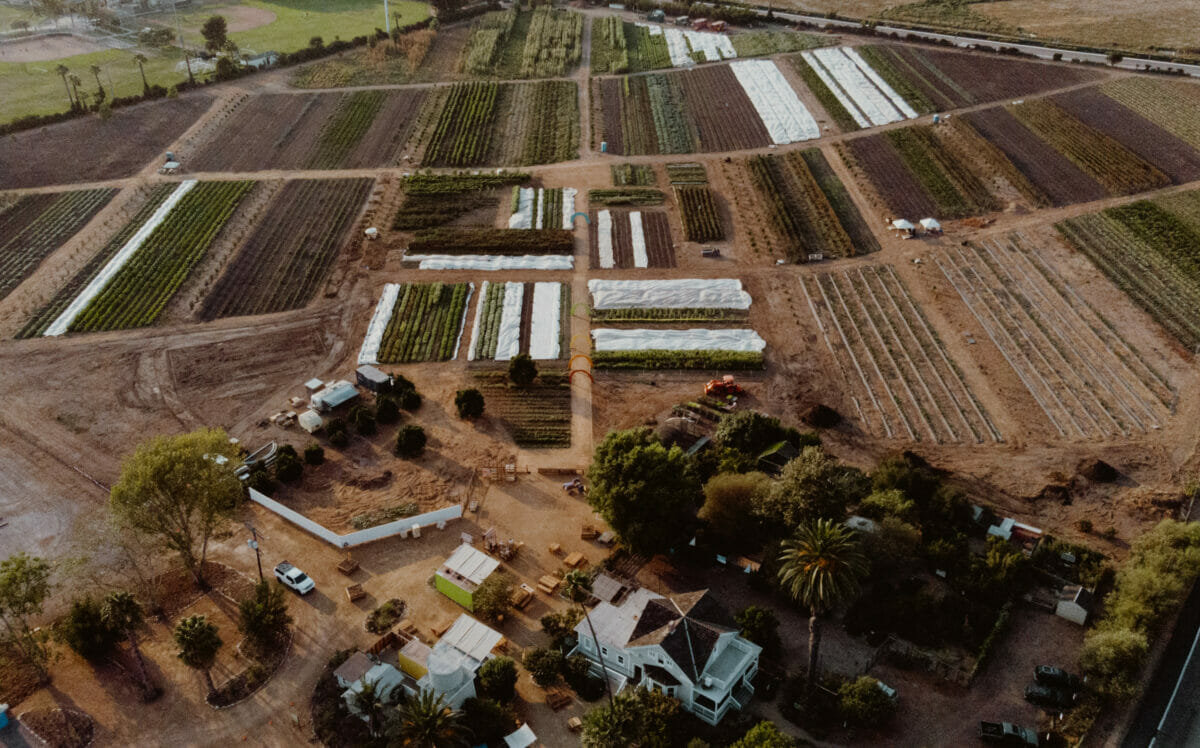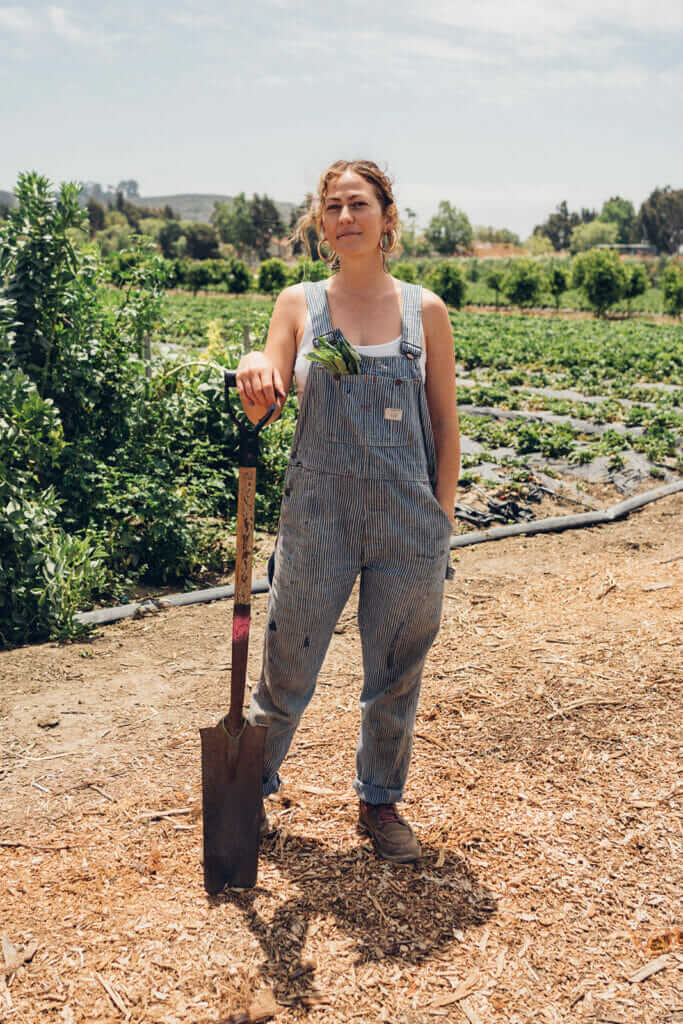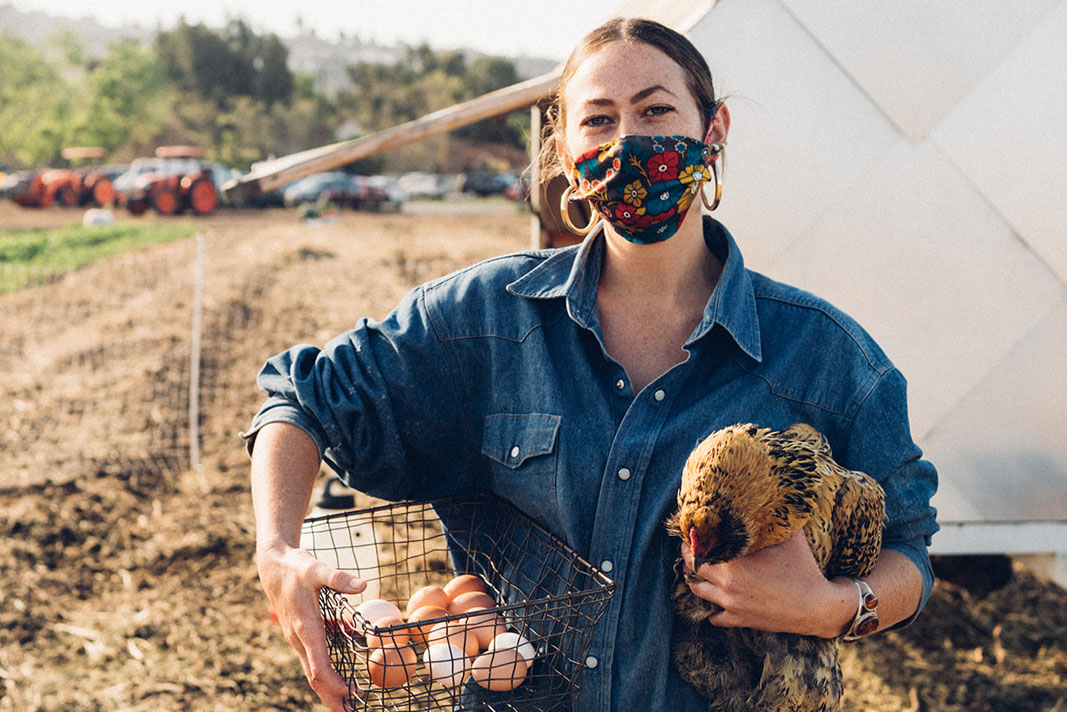How a Hairstylist Blossomed Into a Budding Farmer
In southern California, the Ecology Center is tending to a future generation of farmers through a paid apprenticeship program.
Rachel Duhame, a hairstylist in Los Angeles, had been cutting hair for eight years when she decided she needed a change. Despite her suburban upbringing, Duhame was always intrigued by farmers’ markets and the agriculture industry— even without a direct tie to it.
“It’s like that thread got pulled on and for many years, I would just read and watch documentaries, and continued to be interested and invested in [agriculture],” says Duhame, who didn’t have a model to follow. “There was a yearning to have more access, but that was just not really realistic. Like… who’s a farmer?”
Through the Ecology Center, a regenerative organic farm and nonprofit educational center in southern California, Duhame found her access point into the field. Last March, the center invited apprentices to spend six months learning about regenerative agriculture—and to get paid to do so. Duhame was one of eight apprentices the Center selected from a batch of 130 applicants.
Evan Marks, executive director of the Center, took part in farm apprenticeships himself during his journey into agriculture, and he believes they’re an important part of teaching the next generation of farmers. “Farm apprenticeships are happening all over the country and that’s great,” he says. “For our version, we took a lot of pieces from UC Santa Cruz’s [agroecology] program and adapted them to our own geography.”
In addition to teaching apprentices about crop rotation, cover cropping, composting, seed saving and cropplanning, the program aims to show apprentices how to cook the food grown on the farm through an on-site culinary team. There’s also an educational component that encourages apprentices to share what they’ve learned with other parts of the community, such as in an ecological book club or by hosting farming workshops for children.
“I love that about farming, that apprenticeship feels like the most authentic way to cut your teeth, to just get in and dig in,” says Marks, who founded the Ecology Center in 2008 after he made a similar jump into farming. A surfer who turned to agriculture as a way to make a difference in how the industry impacted the oceans, Marks fell in love with farming and got a degree in agroecology from UC Santa Cruz.

The Center operates a 28-acre farm in San Juan Capistrano as its main property, in addition to a small satellite farm in San Diego, where Duhame started volunteering the day she moved to the area. Even without prior farming experience—aside from a year of on-and-off volunteering at the farm—she was enthusiastic about expanding her agricultural knowledge, and she was excited to be chosen for the apprenticeship program. “It’s the funniest dichotomy,” she says. “I am still doing hair on the weekends in between working at the farm.”
The program, which ran from March through October, divided the apprentices into teams of two and rotated each group through two months in four different specialties—culinary, the field, market garden and propagation.
“The field is harvesting and cultivating. You harvest all day or you weed all day,” says Duhame. The market garden, she adds, is much more diverse. “It’s our small hand scale. It’s what you think when you picture small-scale farming: You do everything from bed prep, adding amendments to the soil, turning it over, shoveling and creating rows.”
For the culinary section, the work was seasonal and ranged from making strawberry jam for a local strawberry festival to assisting with and cooking for farm-to-table dinner events hosted by the Center. The propagation portion took place in the on-site greenhouse. “It’s a lot of the back end stuff like ordering seeds, crop planning and the front like organizational stuff,” says Duhame.
When Marks first launched the Ecology Center, the land was home to a 140-year-old empty farmhouse on a dirt lot owned by the city, only one acre of which was allotted to the Center as workable land. Now, with expanded acreage and community opportunities, Marks describes it as an “ecological oasis.” In addition to the apprenticeship program, the center offers a CSA with more than one 750 members, farm-to-table meal events and additional educational programs. “We are not just a resource for culture and community,” he says, “but we are deeply nourishing and healing the food system from the ground up.”

To both Marks and Duhame, the apprentice program—which is scheduled to run again in 2022—was a success. While she’s keeping her job as a hairstylist for now, the apprenticeship proved that having an on-farm job is a lifetime endeavor with which she’d like to keep up.
Reflecting on the experience, Duhame says she would push anyone with an interest in farming or agriculture to dive deeper into doing the physical work. “The intimidation factor can be very big with something as vast as farming or agriculture,” she says. “But even if it’s growing microgreens in your window or volunteering once a month on that little farm, I feel passionate about encouraging people to go for it.”
Follow us

This work is licensed under a Creative Commons Attribution-NoDerivatives 4.0 International License.
Want to republish a Modern Farmer story?
We are happy for Modern Farmer stories to be shared, and encourage you to republish our articles for your audience. When doing so, we ask that you follow these guidelines:
Please credit us and our writers
For the author byline, please use “Author Name, Modern Farmer.” At the top of our stories, if on the web, please include this text and link: “This story was originally published by Modern Farmer.”
Please make sure to include a link back to either our home page or the article URL.
At the bottom of the story, please include the following text:
“Modern Farmer is a nonprofit initiative dedicated to raising awareness and catalyzing action at the intersection of food, agriculture, and society. Read more at <link>Modern Farmer</link>.”
Use our widget
We’d like to be able to track our stories, so we ask that if you republish our content, you do so using our widget (located on the left hand side of the article). The HTML code has a built-in tracker that tells us the data and domain where the story was published, as well as view counts.
Check the image requirements
It’s your responsibility to confirm you're licensed to republish images in our articles. Some images, such as those from commercial providers, don't allow their images to be republished without permission or payment. Copyright terms are generally listed in the image caption and attribution. You are welcome to omit our images or substitute with your own. Charts and interactive graphics follow the same rules.
Don’t change too much. Or, ask us first.
Articles must be republished in their entirety. It’s okay to change references to time (“today” to “yesterday”) or location (“Iowa City, IA” to “here”). But please keep everything else the same.
If you feel strongly that a more material edit needs to be made, get in touch with us at [email protected]. We’re happy to discuss it with the original author, but we must have prior approval for changes before publication.
Special cases
Extracts. You may run the first few lines or paragraphs of the article and then say: “Read the full article at Modern Farmer” with a link back to the original article.
Quotes. You may quote authors provided you include a link back to the article URL.
Translations. These require writer approval. To inquire about translation of a Modern Farmer article, contact us at [email protected]
Signed consent / copyright release forms. These are not required, provided you are following these guidelines.
Print. Articles can be republished in print under these same rules, with the exception that you do not need to include the links.
Tag us
When sharing the story on social media, please tag us using the following: - Twitter (@ModFarm) - Facebook (@ModernFarmerMedia) - Instagram (@modfarm)
Use our content respectfully
Modern Farmer is a nonprofit and as such we share our content for free and in good faith in order to reach new audiences. Respectfully,
No selling ads against our stories. It’s okay to put our stories on pages with ads.
Don’t republish our material wholesale, or automatically; you need to select stories to be republished individually.
You have no rights to sell, license, syndicate, or otherwise represent yourself as the authorized owner of our material to any third parties. This means that you cannot actively publish or submit our work for syndication to third party platforms or apps like Apple News or Google News. We understand that publishers cannot fully control when certain third parties automatically summarize or crawl content from publishers’ own sites.
Keep in touch
We want to hear from you if you love Modern Farmer content, have a collaboration idea, or anything else to share. As a nonprofit outlet, we work in service of our community and are always open to comments, feedback, and ideas. Contact us at [email protected].by Shea Swenson, Modern Farmer
October 28, 2021
Modern Farmer Weekly
Solutions Hub
Innovations, ideas and inspiration. Actionable solutions for a resilient food system.
ExploreExplore other topics
Share With Us
We want to hear from Modern Farmer readers who have thoughtful commentary, actionable solutions, or helpful ideas to share.
SubmitNecessary cookies are absolutely essential for the website to function properly. This category only includes cookies that ensures basic functionalities and security features of the website. These cookies do not store any personal information.
Any cookies that may not be particularly necessary for the website to function and are used specifically to collect user personal data via analytics, ads, other embedded contents are termed as non-necessary cookies.
